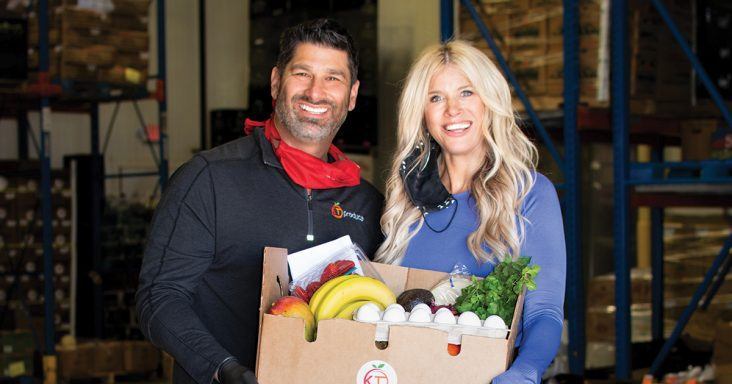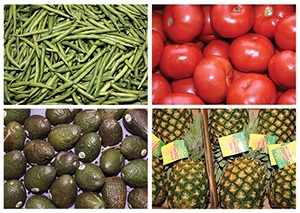KT Produce pivots to consumer sales amid COVID-19 pandemic
by June 1, 2020 1:23 pm 2,047 views

Chris and Michelle Thompson, owners of Lowell-based KT Produce, hold a KT Fresh Box that the produce distributor has been selling to consumers during the COVID-19 pandemic. The company started selling its produce directly to consumers after efforts ramped to mitigate the health crisis.
Chris Thompson, owner and president of Lowell-based produce distributor KT Produce, had about $500,000 of product in inventory and en route on trucks when schools were closed and restaurant dine-in service was stopped in mid-March as efforts ramped to mitigate the spread of COVID-19 (coronavirus).
Over the next week, sales declined by 90%. The company laid off about 60% of its workers after about half of the restaurants closed, while the remainder stayed open with drive-thru, curbside pickup or delivery services.
Thompson said KT Produce changed its customer base organically as it continued to receive truckloads of produce destined for its nearly 1,500 customers in the foodservice industry in northwestern and central Arkansas and southwestern Missouri. The company orders truck shipments of produce from farms nationwide, including those in California, Texas, Idaho and Florida.
“We were unloading hundreds of thousands of dollars worth of product knowing that we didn’t have anywhere to go with it,” Thompson said. “About the same time, the grocery stores were getting hammered pretty hard. You go into a grocery store, and the produce shelves were empty.”
The company had a produce surplus, and customers needed the produce. That led KT Produce to start selling it directly to the consumer.
Before the health crisis, 95% of the company’s sales comprised wholesale produce distribution to hotels, hospitals, restaurants, schools and businesses with a commercial kitchen. By the end of that first week of mitigation efforts in mid-March, KT Produce began selling its produce to consumers and allowed curbside pickup of orders.
The company started to promote the new service on social media even though it didn’t have a social media presence before the pandemic. As a wholesale distributor, Thompson didn’t see a need for a social media presence. The company had 12 Instagram followers before the pandemic, and most of those were family members, he joked. Now, it has 2,500 followers on Instagram.
“We started blasting stuff out and people started showing up,” Thompson said. “It’s been amazing. We’re blessed. I had no idea that people would come. It was out of desperation that we did it, and then it was like, ‘This is working.’”
KT FRESH BOX
Customers can order produce and other items a la carte online at ktfreshbox.com. Within an hour of placing an order, customers can collect the items at the company’s 30,000-square-foot distribution center and corporate office at 305 S. Lincoln St. in Lowell. When they arrive, customers open their vehicle’s trunk, and a KT Produce employee wearing a mask and gloves will place the items in the vehicle. Customers of Northwest Arkansas cities along the Interstate 49 corridor can also receive next-day shipping on their orders for $9.99.
The most popular consumer product has been the KT Fresh Box, which includes between 25 and 30 pounds of produce, recipes and items such as eggs or bread, for $35.
“That’s what’s kept the enthusiasm going is because people are getting their KT Fresh Box. They don’t know what’s in it. They go home, and they do what they’re calling an unboxing. They’ll unbox it. Some of them do it on video, and some of them do it and take pictures. They take everything out of the box, and they line it up and take pictures of it. Usually, it will have three or four recipes in it.
“This week, we did a Cinco de Mayo theme. There was stuff to make enchiladas, Mexican street corn, jicama cabbage slaw recipe. Not only do you get all your essentials for your house, but it’s fun for people to make the recipes. Then, they take pictures of the food and post it.”
Some of the box’s recipes are the company’s, from online or from area chefs, who are friends and customers of the business. An area restaurant known for its collard greens created a video recipe for the produce, leading to increased collard greens sales.

“It’s been a lot of fun, it’s caused us to be creative and think outside the box and try some new things,” Thompson said. “It’s diversified us. One reason we keep doing this is that what if this happens again? If we have to go through this again, we want to be already set up. If this is the new norm, we can’t put all our eggs in that one basket anymore.”
He thought his business model before the pandemic was diverse but quickly found out it wasn’t.
WORKERS REHIRED
Sales remain down about 70% compared to before the health crisis, but the company has since rehired employees who’ve wanted to come back. The company employs about 65 full-time workers, and the consumer business accounts for 20 employees.
Most of the company’s sales continue to be attributed to the foodservice industry, but consumer sales have started to comprise the most transactions. Consumer sales volume has been as great as 200 to 300 transactions per day, or that many people in vehicles coming to pick up items curbside daily.
“When a family buys produce, they’re not spending more than $30 to $40 where a restaurant is spending several hundred dollars,” he said. The company continues to receive orders from new customers, but most customers comprise repeat business and usually purchase items once or twice weekly.
Thompson said the company might reduce the number of days it offers curbside pickup at the company’s distribution center and may offer pickup in areas away from the distribution center as truck traffic and restaurant dine-in service ramp. Currently, the pickup is from 10 a.m. to 3 p.m. Monday through Saturday. It’s closed Sundays.
SERVICE TO CONTINUE
Thompson said customers want to continue to purchase products directly from the company. It’s fresher and higher quality compared to grocery stores, he said.
“We buy direct from the farms, rather than [the produce] sitting around and going to another warehouse and then going to the grocery store,” Thompson said. “People are noticing the quality difference, the freshness and … there’s been a push for buying local, supporting local businesses for a while. It seems like people are making more of an effort right now to support local businesses.
“We’re selling at what I think is a pretty deep discount,” he added. “We’re not gouging. We’re not trying to get rich. We’re just trying to help our employees and help the consumers, the community, and we’re just trying to keep things going.”
Along with the consumer service, the company still distributes produce to the foodservice industry but with about 10 delivery trucks as opposed to 38 trucks before the pandemic.
Thompson was uncertain how quickly his business-to-business sales would return, but he expected the partial reopening of dine-in service at restaurants would help. Even without a second wave of COVID-19, that business would likely come back slowly.
The blended business model of wholesale and consumer sales is sustainable. But Thompson hopes the business-to-business sales return to normal this year. If people start returning to restaurants as dine-in service resumes, he expects his wholesale business to rise and the consumer business to moderate.
“The idea would be to keep a decent portion of the consumer business going,” he said. “We’re going to keep adding new products and keeping things interesting and inventive with new products and services.”
In 2019, revenue rose to nearly $30 million, from about $26 million in 2018. The family-owned company was established in 2005 and has a distribution center in Little Rock.
